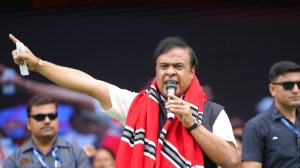Stay updated with the latest - Click here to follow us on Instagram
CM Devendra Fadnavis seeks Centre’s nod for Rs 9,000-cr smart villages project
The scheme plans to connect grampanchayats across 40,000 villages and aims at ‘using communication to bring in reforms in the agriculture sector’.
 The decision to extend the digital network through grampanchayats is aimed at making villages socially and economically vibrant, Devendra Fadnavis said.
The decision to extend the digital network through grampanchayats is aimed at making villages socially and economically vibrant, Devendra Fadnavis said.
In its bid to better link rural Maharashtra, the state government has asked the Centre to sanction the Rs 9,000-crore smart villages project. Chief Minister Devendra Fadnavis has urged the Union Minister for Communications and Information Technology, Ravi Shankar Prasad, to give the go-ahead for the scheme, which plans to connect grampanchayats across 40,000 villages.
At present, a similar project is underway in the state, where the government in partnership with Microsoft has provided communication technology to a tribal-dominated, malnourished village, Harisal.
WATCH VIDEO | Shocking! Boy Paraded Naked to Please Rain God in Drought-hit Village
The Centre, too, wants to strengthen communication across rural India under the flagship project Bharat Net.
[related-post]
The decision to extend the digital network through grampanchayats is aimed at making villages socially and economically vibrant, Fadnavis said.
“The communication network can play a significant role in erasing the divide between urban and rural Maharashtra. However, the larger objective of this project is economic empowerment of villages,” Fadnavis said.
At a meeting with officials representing the ministries of finance, agriculture and cooperation and markets recently, the chief minister stressed on application of communication technology in agro-industrial practices, such as creation of virtual markets. At Harisal, the communication network has paved the way for tele-health and tele-education services.
However, the main thrust of the government is on using communication to bring in reforms in the agriculture sector, the CM said. In the past five years, the state has registered a negative agriculture growth, which has also impacted the overall state growth.
Apart from the water crisis, another major detrimental factor for the agriculture sector has been the lack of a
robust market. The absence of agro-industries and food processing sector has meant inadequate returns for almost 60 per cent of people dependent on agriculture.
“Sustainable agriculture would require effective market linkages. The farmers will have to be provided with fora to sell their products. This is where digital communication can open doors for farmers, as aggregators can step in to provide market linkages. This would also promote the service sector,” Fadnavis said.








